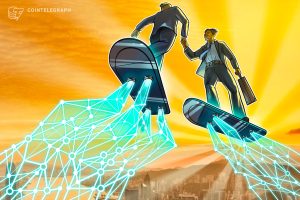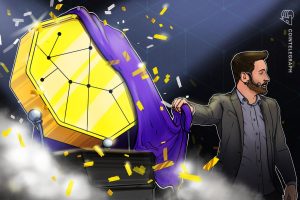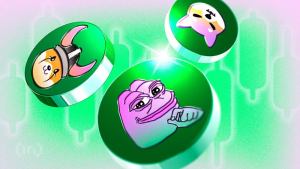Fashion icon Phillip Plein goes crypto
In an attempt to bring the fashion industry into new innovations and trends, many brands are entering the cryptoverse to test out the waters. Fortunately, the crypto industry has its arms wide open, ready to accept the fashion world and grow.
One fashion designer who has recently started dipping his toes in the crypto world is Philipp Plein. He participated in Decentraland’s Metaverse Fashion Week, showcasing a collection alongside Dolce & Gabbana, watch company Jacob & Co and many others who joined Decentraland in an attempt to bring fashion and the Metaverse together. During the show, Plein used the skull that is so apparent in his brand to not only present the models but showcase his work.
Cointelegraph stopped by the launch event for Plein’s new Museum of NFT Art concept store, which brings his brand into the crypto industry and showcases how it plans to take a fashion-forward approach to crypto — in style and in the heart of London.
His crypto start
It wasn’t just Metaverse Fashion Week that got Plein into crypto. In 2021, something sparked within him. “There was no built plan. It was just everyone was talking crypto, everyone was saying it was cool, and it was happening. I didn’t have any vision,” the designer told Cointelegraph.
Regardless, he discovered that his vision was to help people like his mother understand and participate in the crypto industry — but to make it high fashion and ensure that it’s truly accessible for everyone.
Plein first started accepting crypto in his online shops, but the payment option was soon introduced to the brick-and-mortar stores around the world as well, allowing anyone to take advantage of the new technology. Garments in the stores have QR codes that, when scanned, direct the prospective buyer to a website that shows how much they cost in British pounds, Bitcoin (BTC), Ether (ETH) and TerraUSD (UST), among the other accepted cryptocurrencies.

When asked how exactly the brand organizes 25 different cryptocurrencies plus the local currency, Plein told Cointelegraph that “We’ve developed a very complex way to do it. Every 10 minutes, we update the exchange rate on the website. So, if you go on the website and click on the sneaker to know the price, every 10 minutes you will get an updated price. So, we are getting really close to the actual price of the moment.”
But what if you want to return the product and the price of Bitcoin has increased? Plein has come up with a solution. “If you want to return it in a month or two, we will give you the same value of what you spent in the currency in the country you live in. For example, if you buy this for 100 pounds, which is 1 Ether, and in three months ETH goes up, you will get 100 pounds back.”
Plein wants to make the onboarding processing easier. As such, the offline stores cultivate an environment where everyone can learn about crypto through an application developed by Plein and his team. Sales associates are there to answer questions and provide insight on how Philipp Plein and crypto are a match made in fashion, bringing everyone interested into the crypto community without any of the intimidating parts. Plein added:
“I have to make it accessible for my mum, so that is my vision and my mission.”
MONA
The event was put together to celebrate the opening of the Museum of NFT Art, or MONA. On the third floor of Plein’s London shop, he invited guests to view a presentation of his nonfungible tokens. He showcased NFTs of monster figures along with screens that displayed his products. Here and in his stores, Plein wants to be “the one who makes you own your first NFT.”

The Museum of NFT Art was built in-house because Plein does not “like to work with agencies. So, I created my own publishing house and started to work with the people. Now, we pick our own team and offer our services for free.”
The issue with other NFT platforms is the fees, he said. But Plein sees NFTs and onboarding people differently: “We don’t aim for money. We make our money with our products. We developed this platform for our needs, and now we make it accessible for other people.”
Now, here’s where it gets interesting.
The NFTs can be bought in-person via a sales association, but this is only one part of what customers experience when visiting the MONA London shop. He aims to provide a variety of ways for users to experience NFTs that can help anyone with any level of crypto knowledge.
“People started to be interested, but they weren’t able to pay with crypto because they didn’t have crypto. They started to ask, ‘How could we get a Philipp Plein NFT monster?’ And then we started selling them from the website like a shoe. You can pay with a credit card, Apple Pay — you can pay with whatever you want, and then we send you the NFT. And this was interesting. We sold about 1 million in NFTs in two to three months.”
On top of a direct credit card or Apple Pay purchase, NFTs can also be bought with cash. “I’ve never heard of paying for an NFT in cash. So, if you want to come to London, you can pay in cash.” He wants to make NFTs accessible “to my mother, who will never buy an NFT.”
As a cherry on top of this innovation in the ever-changing NFT market, Plein laid out his biggest issue with NFTs: gas fees. “They sell you the NFTs, and then you have to pay gas fees,” He added: “Explain to my 67-year-old mum what a fucking gas fee is.”

So, Plein decided to bunch together the NFT’s price and the gas fees so that customers don’t have to think about it. Indeed, with reports of Yuga Labs’ Otherdeeds NFTs spiking some gas fees up to 5 ETH, the issue presents a huge problem, one that many don’t anticipate. “Some people see 10 euro shipping and will not even buy the product because they have to pay for shipping. We will sell all of our NFTs at a price that includes the gas fee, so you don’t have to think about it.”
As part of the running joke of what one can actually do with an NFT, another part of the Plein NFT experience includes a picture frame, or hardware for a wall, and even a Christmas tree ornament. Anyone has the chance to hang their Plein NFT right next to their favorite ornaments, and maybe Santa will bring one that can be burned into a wearable in Decentraland.
“So, my mum, who now has an NFT, asks, ‘Well, what do I do with it?’ Okay, mum, now you hang it on your wall.”
The future
Cointelegraph asked Plein about the future of the Philipp Plein brand and its Metaverse endeavors — in particular, how he mixes his personal ideas with both his real-life and Metaverse brand.
According to Plein, fashion is one of the toughest industries imaginable, one where “You have to reinvent yourself from zero several times a year. Each season, the trends are so unpredictable, and the consumer is very hard to control in regard to these unpredictable seasonal trends.”
Plein has himself tried out many new things to see what sticks, not only with Metaverse Fashion Week but also with his spring/summer 2022 campaign with Megan Fox and photographer Stephen Klein. “The only way to work with this is to be open-minded, to be experimental, and to try new things to understand what the consumer likes.”
Plein also sees the Metaverse as a way to explore trends to see what will stick. He believes that while “The Metaverse is not there yet, it’s not going to take too much time, maybe three to five years, because the technology is much faster now than in the past.”












